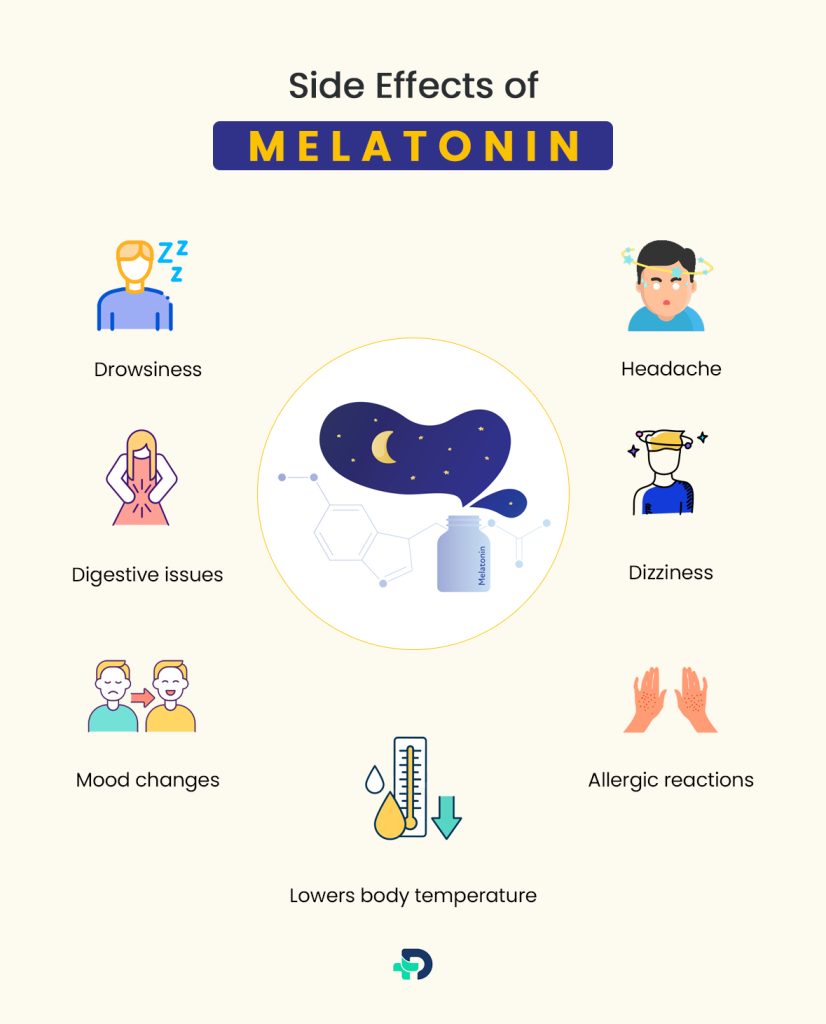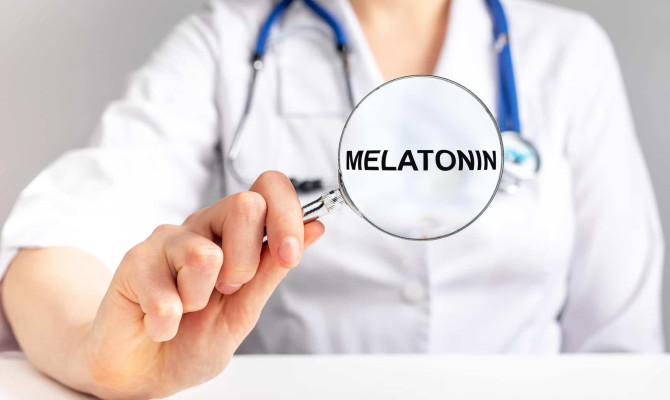Melatonin For Anxiety: Dosage & Side Effects

- Melatonin
- 02 Oct 2023
Introduction
Melatonin
In the fast pace modern world, anxiety has become an increasingly prevalent issue affecting millions worldwide. There are several methods for controlling anxiety, and research into efficient natural treatments is ongoing. The usage of melatonin, a hormone most frequently linked to controlling the sleep-wake cycle, is one intriguing approach that has drawn interest recently. Naturally, the pineal gland in the brain plays a crucial role in governing our circadian rhythms and promoting restful sleep. However, emerging research has suggested that melatonin may hold potential beyond its sleep-inducing properties. It raises a question: Can melatonin also be a viable option for elevating anxiety?

This article deals with the fascinating relationship between melatonin and anxiety. We will explore the science behind it, its influence on sleep and mental health, and the existing research on its potential as an anxiety management tool. Additionally, we will go over alternate strategies and offer helpful advice on how to utilize it securely. 1 Introduction | Researched based study from National Institutes of Health
Role
Role of Melatonin
Recognizing melatonin
- It is a hormone that the pineal gland in the brain naturally produces.
- It is essential for controlling the circadian rhythm, the body’s internal clock.
- Its production is influenced by light exposure with levels rising at night to promote sleep.
Role of melatonin in sleep regulation
- Its main purpose is to encourage and regulate sleep, which is why it is frequently referred to as the “sleep hormone.”
- It aids in sending a signal to the body to prepare for sleep and wind down. The use of melatonin is a critical factor in initiating the sleep cycle. 2 Role of Melatonin | Researched based study from National Institutes of Health
Explanation of anxiety and its prevalence
Anxiety is a normal stress response, but when it persists or gets out of control, it can develop into a mental health issue.
The need for effective anxiety management
- It can profoundly impact an individual’s daily life, affecting work, relationships, and overall well-being. 1 Role of Melatonin | Researched based study from National Institutes of Health
Sleep & Anxiety
How does Sleep Affect Anxiety Levels?
- Emotional regulation
- Increases vulnerability to anxiety
- Sense of worry
- Impaired brain function
- Biological factors
- Physical symptoms
Quality sleep is not just about feeling restored. It plays a profound role in our mental and emotional well-being. Here is how it can affect anxiety levels:
Emotional regulation
- Adequate sleep helps regulate emotions. When sleep is disrupted or insufficient, it becomes challenging to manage stressors effectively.
- Anxiety-prone individuals may find it harder to cope with daily challenges.
Increases vulnerability
- Sleep deprivation can make you more susceptible to anxiety triggers.
- It lowers your threshold for stress, making everyday worries feel more overwhelming than they would with sufficient sleep.
Worry & Rumination
- Poor sleep can lead to increased rumination and a continuous cycle of negative, anxious thoughts.
- This can heighten anxiety as your mind struggles to find resolution and rest.
Impaired cognitive function
- The ability to think clearly, including making decisions and solving problems, depends on getting enough sleep. Lack of sleep can impair these abilities, making it challenging to address and resolve sources of anxiety.
Biological factors
- Sleep deprivation affects the balance of neurotransmitters in the brain, including those related to mode regulation.
- This can contribute to increased anxiety levels.
Physical symptoms
- Poor sleep can exacerbate physical symptoms associated with anxiety, such as muscle tension and irritability.
- These symptoms can, in turn, increase feelings of anxiety. 3 Sleep and Anxiety | Researched based study from National Institutes of Health ,4 Sleep and Anxiety | Researched based study from National Institutes of Health ,5 Sleep and Anxiety | Researched based study from National Institutes of Health ,10 Sleep and Anxiety | Researched based study from National Institutes of Health
Mental Health
Sleep for Mental Health
Importance of quality sleep for mental health
- Mood stability
- Reduces the risk of mental health disorders
- Recovery
- Stress resilience
Sleeping well is more than just a luxury or a question of feeling rested. It is an essential pillar of good mental health. Here are some reasons why getting enough sleep is so important for preserving and enhancing mental health.
Mood Stability
- Mood and sleep are intimately related. Bipolar illness and depression are two additional disorders that can be exacerbated by chronic sleep deprivation or poor sleep quality. Conversely, improving sleep can be a valuable component of treating these conditions.
Reduce the Risk of Mental Health Disorders.
- An increased risk of mental health illnesses, including anxiety disorders in some situations, is linked to persistently poor sleep habits. Setting a high priority on good sleep can provide protection.
Healing & Restoration
- The body goes through vital repair and rejuvenating processes while in deep sleep stages. This entails cleaning the brain of waste materials and mending natural connections. These processes are crucial for overall mental health.
Stress Resilience
- Quality sleep equips you with greater resilience to stress. When you are well registered, you are better equipped to face challenges and handle unexpected situations without becoming overwhelmed or anxious. 10 Sleep for Mental Health| Researched based study from National Institutes of Health
Supplement
Melatonin Supplement
Melatonin supplement uses and benefits:
- They are synthetic versions of the hormone available in various forms (pills, liquids, etc.)
- These supplements commonly address sleep-related issues, including insomnia and jet lag.
- They can help reset disrupted sleep with cycle and improve sleep quality.
- They may also have other potential uses, such as managing shift workers’ sleep disorders or helping them adjust to new time zones during travel.
Melatonin as a sleep aid
It can shorten the time it takes to fall asleep and lengthen overall slumber. Use the supplements as instructed, and if you have any concerns or underlying medical conditions, speak with a healthcare expert. 2 Melatonin Supplement | Researched based study from National Institutes of Health
Scientific Study
Scientific Studies on Melatonin for Anxiety
Scientific research and conclusions
Many research has looked into the connection between melatonin and anxiety. Its area of focus is melatonin’s role in regulating the sleep-wake cycle and its potential impact on anxiety, as sleep disturbances often accompany anxiety disorders. 3 Scientific Studies | Researched based study from National Institutes of Health
- A study examines melatonin’s effects on patients with generalized anxiety disorder. The results suggested that melatonin supplementation improved sleep quality, indirectly reducing anxiety symptoms. 5 Scientific Studies | Researched based study from National Institutes of Health
- The use of melatonin as a treatment for persons with anxiety and depressive disorders was the subject of a different investigation. It was found that melatonin when combined with traditional treatments contributed to a reduction in anxiety symptoms. 8 Scientific Studies | Researched based study from National Institutes of Health
- Additionally, animal studies have suggested that it may have anxiolytic (anxiety-reducing) effects, possibly due to its interaction with neurotransmitters in the brain. 9 Scientific Studies | Researched based study from National Institutes of Health
Effectiveness in reducing anxiety
- It may help reduce anxiety by improving sleep quality, which can alleviate some symptoms. However, its direct impact on anxiety levels may not be as pronounced as traditional anxiolytic medications.
- It’s important to note that it is not considered a primary treatment for anxiety disorders. It is commonly used as a complementary or adjunctive therapy alongside other treatments. 3 Scientific Studies | Researched based study from National Institutes of Health
Dosage
Dosage of Melatonin for Anxiety
Working with a healthcare practitioner to find the ideal dosage for your unique needs is crucial because the proper dosage differs from person to person.
- Low doses (0.5 mg to 3 mg): For anxiety-related sleep issues such as difficulty falling or staying asleep. Lower amounts may be sufficient.
- Higher doses (3 mg to 10 mg): In some cases, people with more severe sleep disturbances require slightly higher doses. However, it is typically advised to begin with a lesser dose and gradually raise it if necessary, all while following the advice of a healthcare practitioner. 7 Dosage | Researched based study from National Institutes of Health
Side Effects

What are the Side Effects of Melatonin?
When used in the right amounts for a brief period of time, melatonin is usually regarded as safe. Prior to beginning any supplementation, persons with pre-existing medical disorders or those who are taking other prescriptions should however speak with healthcare providers.
Common side effects may include
- Drowsiness
- Headache
- Digestive issues
- Dizziness
- Mood changes
- Lowers body temperature
- Allergic reactions
The following are some typical negative consequences linked to melatonin supplementation:
Drowsiness
- It is often used to help improve sleep, but for some people it may cause excessive drowsiness, especially if taken in higher doses or during the day.
Headache
- Some people may experience headaches as a side effect.
Digestive issues
- It can occasionally cause digestive problems such as nausea, stomach cramps or diarrhea.
Dizziness
- Some users have reported dizziness or a sensation of feeling lightheaded after taking it.
Mood changes
- In rare cases, it might lead to mood changes, including increase feelings of irritability or sadness.
Lower body temperature
- It may slightly lower body temperature, which could be a concern for people who are sensitive to colds or have certain medical conditions.
Allergic reactions
- Some people may experience allergic reactions to melatonin supplements, which can include skin rashes, itching, or swelling. 6 Scientific Studies | Researched based study from National Institutes of Health
FAQs
Melatonin For Anxiety – Frequently Asked Questions
Can melatonin make you feel calm?
- It may indirectly contribute to feelings of calm by improving your sleep quality, reducing sleep-related anxiety, which could potentially contribute to a sense of calmness.
Can I take melatonin every night?
- It is generally safe for short-term use, but its long-term use, especially on a nightly basis, should be discussed with the Healthcare professional. The body may become tolerant to it over time if taken regularly.
- If you find melatonin helpful, use it intermittently rather than every night. This approach may reduce the risk of tolerance and dependence.
Does melatonin slow your heart rate?
- It does not typically slow down your heart rate. It primarily functions as a hormone that regulates the sleep-wake cycle and does not directly affect cardiovascular functions like heart rate.
How long does melatonin take to work for anxiety?
- It is not typically used as a fast-acting treatment. It could take some time before symptoms start to change noticeably. Usually, it takes between 30 and an hour before bed.
- The main purpose of it is to control sleep patterns. While it may have some secondary benefits for anxiety-related advances, it is not a direct and comprehensive treatment for it.
Any feedback on this article?
 This Articles content was accurate
This Articles content was accurate Very Informative Article
Very Informative Article I have a question or a comment
I have a question or a comment
 This article contains inaccurate content
This article contains inaccurate content This article was not helpful
This article was not helpful I have a question or a comment
I have a question or a comment
We appreciate your helpful feedback!
Checkout our social pages
References
-
National Institutes of Health
Introduction | Role of Melatonin
-
National Institutes of Health
Role of Melatonin | Melatonin Supplement
-
National Institutes of Health
Sleep and Anxiety | Scientific Studies
-
National Institutes of Health
Sleep and Anxiety
-
National Institutes of Health
Sleep and Anxiety | Scientific Studies
-
National Institutes of Health
Side Effects
-
National Institutes of Health
Dosage
-
National Institutes of Health
Scientific Studies
-
National Institutes of Health
Scientific Studies
-
National Institutes of Health
Sleep and Anxiety | Sleep for Mental health




































